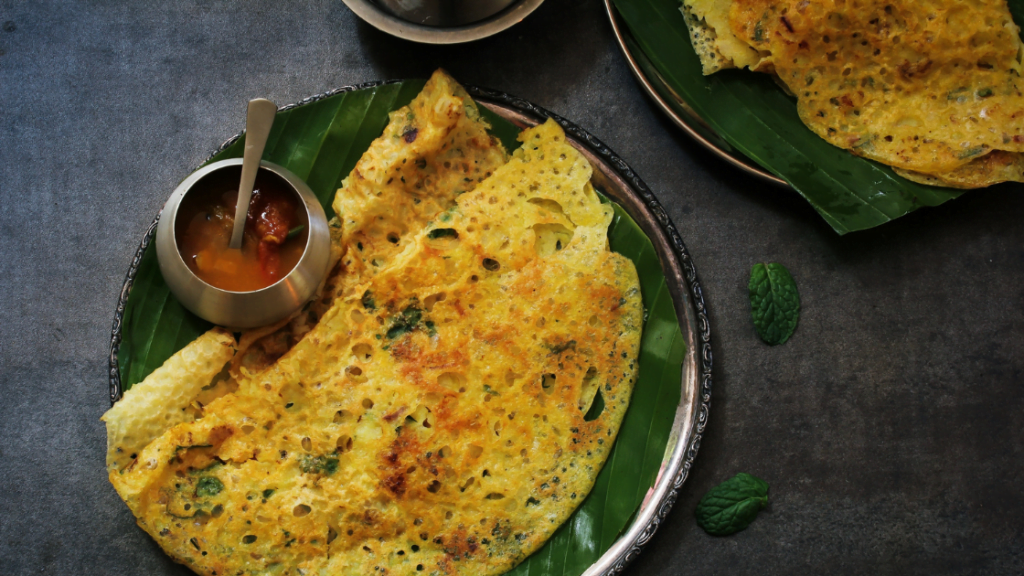Introduction
Set out on a culinary adventure as we delve into the world of South Indian cuisine, uncovering the secrets behind the delectable Rava Dosa Recipe. While the insights from Indian Healthy Recipes provide the foundation, this comprehensive guide aims to not only elucidate the step-by-step process of crafting the perfect Rava Dosa but also to enrich your culinary experience with additional tips, nutritional insights, and a dash of innovation. Let’s explore the world of crispy, flavorful dosas, which are more than just a dish but a culinary experience. Now, without wasting any time, let us get to the Rava Dosa Recipe.
Ingredients
- 1 cup fine semolina (rava/sooji)
- 1 cup rice flour
- 1/4 cup all-purpose flour (maida)
- 1/2 cup yogurt (curd)
- 2.5 cups water (adjust as needed)
- 1/2 tsp cumin seeds
- 1/2 tsp black pepper, crushed
- 1/4 cup finely chopped onions
- 1/4 cup finely chopped tomatoes
- 1/4 cup finely chopped coriander leaves
- 1-2 green chilies, finely chopped
- 1-inch ginger, grated
- Salt to taste
- Cooking oil for making dosas
Step-by-Step Process of Rava Dosa Recipe
Prepare the Batter
Combine fine semolina, rice flour, all-purpose flour, and yoghurt in a mixing bowl.
Add water gradually, whisking constantly to avoid lumps, until you have a smooth, pourable consistency.
Add Flavor and Texture
To the batter, add cumin seeds, crushed black pepper, finely chopped onions, tomatoes, coriander leaves, green chilies, grated ginger, and salt.
Mix thoroughly to ensure that the ingredients are evenly distributed.
Rest and Fermentation
Allow at least 30 minutes for the batter to rest. This step promotes fermentation, which improves the flavour and texture of the dosa.
Heat the frying pan
On medium heat, heat a nonstick or cast-iron frying pan. Before making dosas, make sure the pan is hot enough.
Pour and Swirl
Pour a ladle of batter into the centre of the frying pan and spread it thinly to the edges in a circular motion.
Cooking with Oil
Sprinkle some oil around the edges of the dosa and on top. Cook until the edges of the dosa turn golden and crisp up.
Fold and Serve
Fold or roll the dosa and serve hot with your favourite chutney or sambar.

Tips
Fine The samolina (Rava) flour Is Important
Choose fine semolina flour for a smoother batter and a delicate texture in the dosa.
Balancing the Batter
To achieve the desired consistency, carefully adjust the amount of water. A thinner batter yields a crispier dosa.
Magic on the Frying pan
To achieve that perfect, lacy texture, make sure the griddle is hot enough before pouring the batter.
Experiment with Toppings
To add a delicious twist, top your Rava Dosa with grated cheese, paneer, or finely chopped vegetables.
Experiment with Fermentation
Allowing the batter to ferment for a longer period of time, even overnight in the refrigerator, can improve the flavour and aid digestion.
Healthy Benefits of Rava Dosa
Rich in Carbohydrates
Rava Dosa is high in carbohydrates and provides an instant energy boost.
Protein Boost from Yogurt
The addition of yogurt not only improves the texture of the dosa but also adds a source of protein.
Vitamins and Minerals
The addition of vegetables such as onions and tomatoes provides essential vitamins and minerals.
Fermentation that is easy on the stomach
The fermentation process improves nutrient bioavailability and gut health.
Low-Calorie Alternative
Rava Dosa is a low-calorie option when prepared with little oil, making it ideal for those watching their calorie intake.
Conclusion
You’re not just indulging in a dish when you savor the crispiness and flavours of your homemade Rava Dosa; you’re celebrating the diverse tapestry of South Indian cuisine. Have you begun the journey of making Rava Dosa Recipe? Share your experiences, tips, or unique variations about Rava Dosa Recipe in the comments section below. Let’s continue the discussion and delve into the world of Rava Dosa Recipe together.
Frequently Asked Questions:
- Can I make Rava Dosa with coarse semolina?
- While fine semolina is preferred for a smoother batter, coarse semolina can be used by adjusting the water accordingly.
- Is it necessary to leave the batter to ferment for 30 minutes?
- Fermentation improves flavour, but if you’re short on time, you can make dosas without it, though the texture will be different.
- What is the recommended thickness for a Rava Dosa?
- Traditionally, Rava Dosas are thin and lacy. This necessitates a well-balanced, thin batter and a hot griddle.
- Can I make the batter ahead of time and store it in the refrigerator?
- Absolutely! Refrigerating the batter overnight can help to enhance the flavours and make the dosa-making process easier the next day.
- What are some unique Rava Dosa toppings?
- For an elegant touch, try grated cheese, cooked mushrooms, or a sprinkle of finely chopped bell peppers.
Read our Other Recipes Here
- Beef Chow Mei Fun: Unveiling the Delicious Dancing of Flavours Beef Chow Mei Fun
- House Special Soup: Unveiling the Delights of Chinese-American Takeaway Menus
- Cranberry Chutney: A Delicious Burst of Health in Every Spoonful
- Applebee’s Shark Bowl Recipe: Making the Perfect Shark Bowl at Home
- Powerful Low Carb Ricotta Cheese Recipes: Enjoy Every Bite of Pancake
- Savour the Heritage: Tomato Pie Recipe Delight Reveals Timeless Flavours
- Green Tea Shots Extravaganza: A Sensational Elixir to Lift Your Spirits
- Karaage: Mastering the Fine Art of Japanese Fried Chicken, Crispy Bliss Is Revealed
- The Ultimate Guide to Perfect Rava Dosa Recipe- Crafting Culinary Delight
Watch Recipe: Beef Chow Mei Fun
Watch Recipe: House Special Soup
Watch Recipe: Cranberry Chutney: A Delicious Burst of Health in Every Spoonful











1 thought on “The Ultimate Guide to Perfect Rava Dosa Recipe- Crafting Culinary Delight”